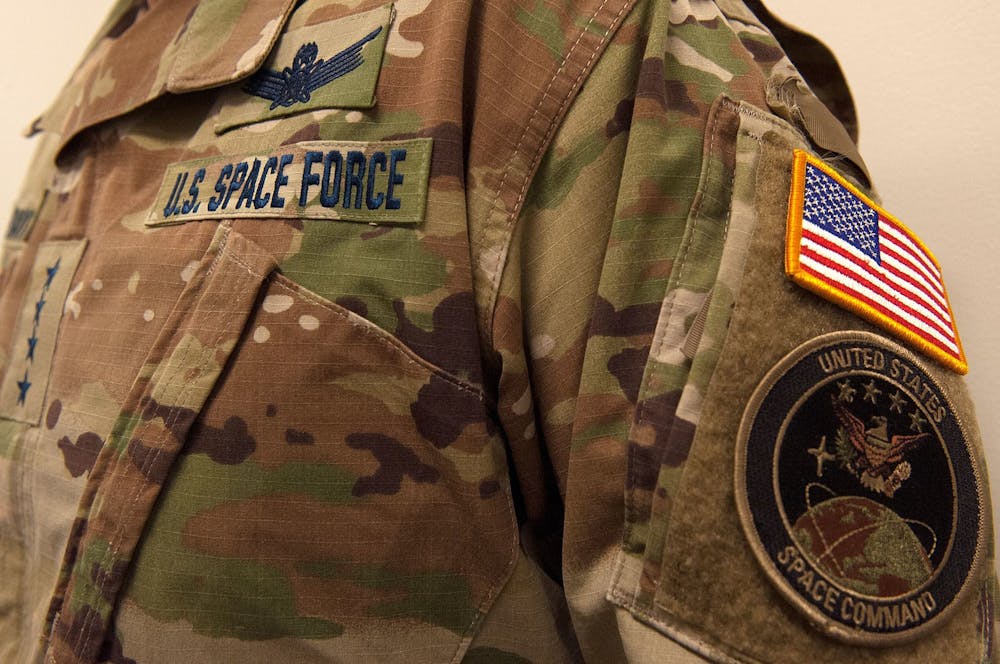The U.S. Space Force (USSF) has chosen Hopkins as its partner in military education. The Space Force’s decision to partner with Hopkins breaks the precedent of military branches establishing their own colleges.
The U.S. military is divided into six branches: Coast Guard, Air Force, Army, Marine Corps, Navy and the Space Force, which was established with the passage of the National Defense Authorization Act in December of 2019. War colleges are traditionally designed to provide military members with educational and professional opportunities that boost their careers. Each branch except for the Space Force has its own war college.
Hopkins will provide an accredited 10-month program to Space Force members to pursue a Master of International Public Policy at the School of Advanced International Studies (SAIS). Officers from the Space Force will be selected for this program through the Hopkins admissions process.
Once enrolled, students will take graduate classes at SAIS as well as courses related to Joint Professional Military Education requirements, which emphasize an interdisciplinary focus on leadership, ethics, international security and public policy. Space Force SAIS students will have opportunities to take STEM courses at the Applied Physics Laboratory and the Whiting School of Engineering (WSE).
In an interview with The News-Letter, Professor of Political Science Daniel Deudney discussed the positive aspects of the partnership.
“We don’t want to have a military that’s composed of one particular group,” he said. “We want it to be broadly representative, and we want it to... be exposed to a broad array of different views. The general objective of Hopkins in the nation's service in this way is an extremely important and admirable one.”
Assistant Vice President for Media Relations and News J.B. Bird explained the motivations behind the partnership in an email to The News-Letter.
“The mission of [Hopkins] and SAIS aligns directly with the requirements USSF had for educating their constituents,“ he wrote. “SAIS has had a longstanding history of inclusion of service members in its community. This is an enhanced opportunity to recruit bright and talented students who will rise to the global challenges of the 21st century.”
The first batch of students will include 60 students, matriculating into SAIS in 2023 and graduating in May 2024. The cohort is anticipated to grow to 85 students in the coming academic years.
Although SAIS has a long history of providing military members with opportunities, some Hopkins students expressed concerns about the partnership.
In an email to The News-Letter, senior Owen Welsh described his disappointment with the prospect of students serving the Space Force’s mission.
“My main gripe/disappointment in this partnership... is that it's being marketed to starry-eyed, young graduate students, without really explaining what they're being taught to do,“ he wrote. “Military engineers regarding space are not going to be building research stations or repairing satellites. They're moving [weapons of mass destruction] from the ground and into space. They're developing ever-increasingly rapid nuclear response programs.”
In response to the partnership, the JHU Dissenters, a recently formed anti-war student organization, held a teach-in with Refuel Our Future on Keyser Quad to address the collaboration and its implications for militarism at Hopkins.
During the event, members of the JHU Dissenters asserted that this development would perpetuate the association of Hopkins with the military-industrial complex, given that the WSE has a history of partnering with defense contractors like Lockheed Martin and Raytheon.
Senior Rohit Sivananthan criticized the University’s decision in an email to The News-Letter.
“It is genuinely disheartening that the university wishes to associate itself with the Space Force,“ he wrote. “Rather than funnel students towards STEM careers complicit in harm, I wish we could have more opportunities to connect with life-affirming causes — such as studying green technology, affordable housing, repairing environmental harm, or contributing to healthcare — and be working towards our shared survival.”
Senior Bonnie Jin added to Sivananthan’s concerns in an email to The News-Letter and claimed that the partnership contrasts the ideals of a democratic University.
“We are not a war college. We should not welcome any institution of war as part of our community,“ she wrote. “The military trains people to obey commands; the university promotes critical thinking and dialogue. The continued presence of and collaboration with the Armed Forces on campus is fundamentally antithetical to the ideals of a free, democratic university.”
Deudney responded to the criticisms that the collaborations between the military and universities are contradictory to the values of democratic academic institutions.
“This is an argument about corruption, and those are real concerns, but... they fail to account for another important value, which is civil control of the military,” he said. “The [U.S.] has been blessed in many ways, but one of the… blessings is that we don’t have a military caste, and we don’t have a problem of insubordination of the military to civilian political leadership.”
Deudney added that during the Trump administration, America departed from the 1967 Outer Space Treaty, which established space as a global commons. He stated that, although it is a step in the wrong direction for the U.S. to pursue space dominance, the Space Force is not at fault for these changes and are merely the people hired to work toward these goals.





